Using events to supercharge your election coverage
Caitlin Dewey, for API’s Better News,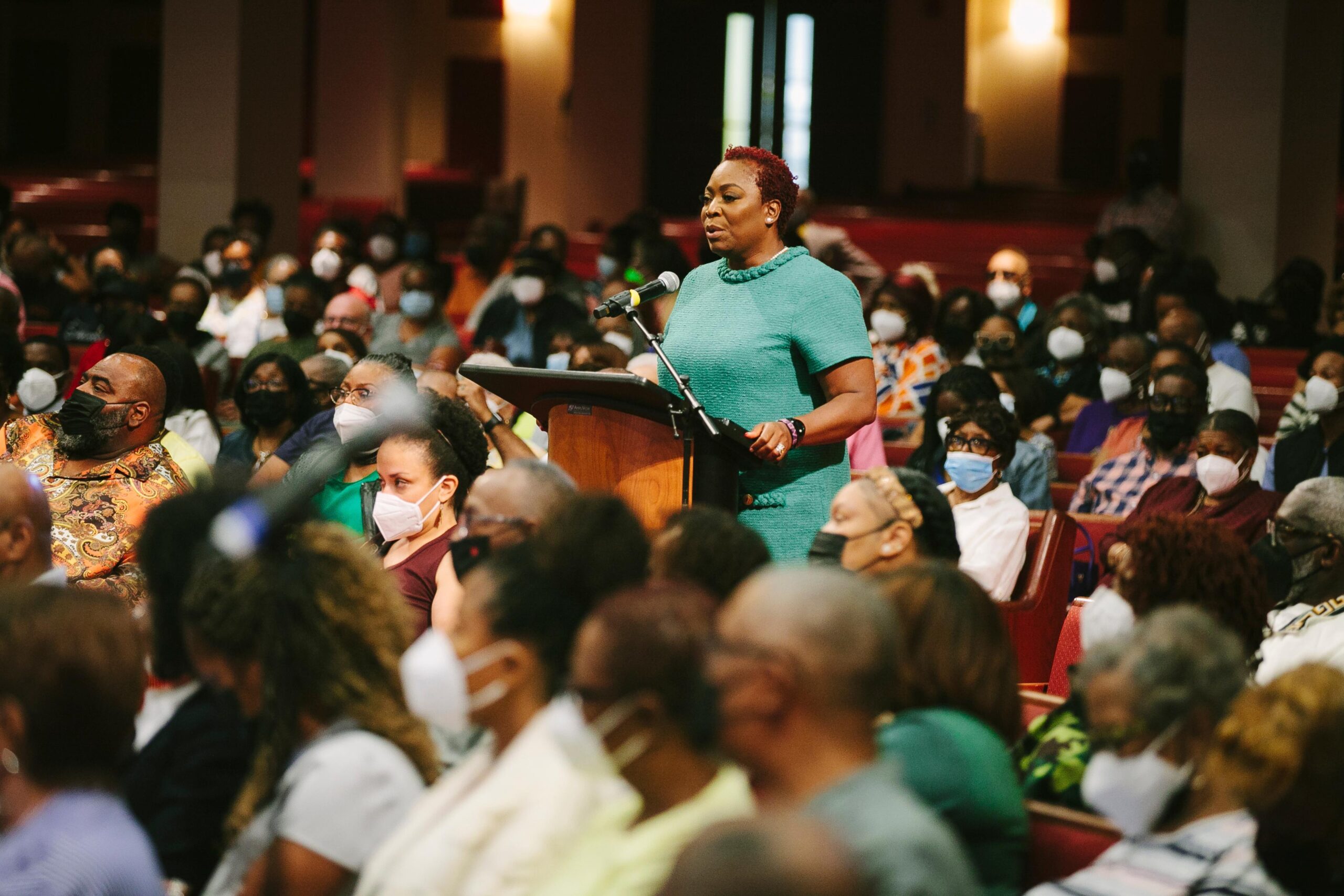
Andrea Lawful Sanders asks a question to 2023 Democratic mayoral primary candidates during the Black Media Matters forum at Enon Tabernacle Baptist Church. (Photo by Zamani Feelings for The Lenfest Institute for Journalism)
With the right tools and partnerships, these events can build connections that last long after the election.This is a series on Better News to a) showcase innovative/experimental ideas that emerge from the Knight-Lenfest Newsroom Initiative and b) share replicable tactics that benefit the news industry as a whole.
This piece features insights from Amy Zielinski, the senior event producer for Vermont Public, which participated in the American Press Institute’s Live Events Sprint for Table Stakes Alumni in 2024. It also includes tips from Maritza Félix, the founder and director of Conecta Arizona; Ben Nishimoto, the vice president of operations and philanthropy at Honolulu Civil Beat; Sam Moody, the associate director of the Colorado Media Project; Donna Ladd, the founding editor and CEO of the Mississippi Free Press; Shawn Mooring, the head of Philadelphia Programs at The Lenfest Institute for Journalism; and Jim Fitzhenry, the Ideas Lab editor at the Milwaukee Journal Sentinel, an alum of the 2017 Major Market and 2022 Alumni Sprints Table Stakes programs.
Conecta Arizona, Honolulu Civil Beat, Milwaukee Journal Sentinel and Mississippi Free Press received funding from the American Press Institute as part of its 2024 Election Coverage and Community Listening Fund.
More from API’s Live Events Sprint program:
- 6 live journalism event ideas you can replicate in your community
- A workbook to take you from journalism event idea to execution
- Leveraging partnerships and sponsorships for journalism events
- Sponsor pitch deck template and accompanying guide
- How to pick the right venue for your journalism event
- A spreadsheet that will help you organize research about your possible venues
- How a “run of show” document can make your journalism event a success
- A run of show template
- An event proposal template to help you get started on your next journalism event
- A checklist for marketing your live journalism events
Every weekday from 2 to 3 p.m., more than 400 people gather to chat in Conecta Arizona’s WhatsApp group. Some days, the Spanish-language publication invites experts or special guests. Other days, the conversation revolves around planned stories or themes.
But every day — even in the lead-up to a tense presidential election that has tainted public discourse in many online forums — guests at Conecta Arizona’s online “cafecitos” expect engaged, thoughtful, civil conversation.
“I am increasingly convinced that this exercise … improves and enlightens us,” one participant wrote in Spanish toward the end of a recent chat, which touched on the role of the Latino vote in the upcoming presidential election.
For Maritza Félix, the founder and director of Conecta Arizona, these conversations are central to both the outlet’s election coverage and its broader editorial mission. Since 2020, Félix said, Conecta Arizona has sought to combat misinformation and polarization, and bolster civic engagement, by building deep connections with its cross-border audience.
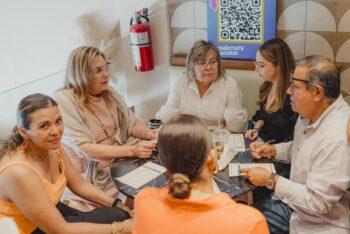
Conecta Arizona’s in-person “cafecitos” grew out of an active WhatsApp group of the same name. Roughly 30 people gathered for a meet-up in Hermosillo, Sonora, Mexico on May 25, 2024. (Photo by Daniel Robles/Conecta Arizona)
For the past three years, Conecta Arizona has also hosted frequent in-person cafecitos, ranging from small coffee klatches to large programmed events, and is ramping up further ahead of the 2024 elections. On Oct. 2, for instance, the outlet will host a town hall with Arizona’s secretary of state, Adrian Fontes, followed by a series of small-group discussions.
“Especially when you’re talking about elections, you need to understand the importance of trust from the community,” Félix explained. “Being present, being consistent — that’s how you cultivate it.”
Developing that sort of engagement takes time, cautioned Félix and other news leaders working on similar projects. But it’s not too late to build events into your election coverage. From candidate forums and debates to town halls and listening sessions, election-themed events can help your news organization build trust, deepen engagement and better align your coverage with your community’s needs and interests.
These events are not typically revenue-drivers — but they go to the heart of journalism’s civic mission. And with the right tools, partners and infrastructure, they can create ongoing community connections that last long after the next election.
Types of election events
Almost any news event can be adapted to elections. (Presidential trivia, anyone?) But the most common formats for election events typically derive from the candidate forum or listening session model. Some examples:
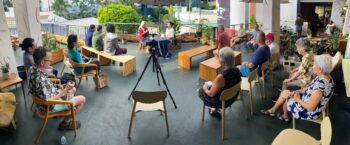
Civil Beat’s “Meet the Candidate” events, hosted at local libraries around Hawaii, are designed to introduce readers to down-ballot candidates in a casual, accessible setting. (Courtesy of Civil Beat)
Candidate debates, meet-and-greets and town halls: Traditional debates and other forums give voters the opportunity to engage directly with political candidates. But these events can look more conversational or intimate, too, as they do at Honolulu Civil Beat’s “Meet the Candidate” events: In September and October, the Hawaii nonprofit outlet is hosting a series of 11 structured, hour-long conversations at local libraries on three islands. The events, which are designed to introduce readers to down-ballot candidates in a casual, accessible setting, have averaged about 30 attendees so far, said Ben Nishimoto, Civil Beat’s vice president of operations and philanthropy.
Panel discussions: These forums bring together experts, community leaders and other stakeholders to discuss specific election-related topics and typically include a moderator who guides the discussion and incorporates audience questions. Think outside the stage and podium, too: In Philadelphia, for instance, the local tech news site Technical.ly has invited officials to a public Slack channel to discuss local tech and workforce policy issues.
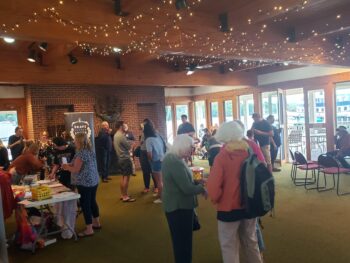
Attendees mingle at a community ice cream social and listening session hosted by Vermont Public in Newport, Vt., on August 28. (Courtesy of Vermont Public)
Community listening sessions: Pop-up newsrooms, listening posts and other forms of community listening are designed to help news organizations better understand their readers’ news and information needs. News outlets can then design their election coverage around the interests and concerns of their readers, rather than follow the talking points of politicians and candidates. In May, August and September, for instance, Vermont Public planned a trio of listening sessions around the state, where attendees could enjoy family activities, eat free burgers or ice cream and chat with reporters about the most pressing issues in their community. The latest installment drew 86 attendees and featured four partner organizations, said Amy Zielinski, the senior event producer for Vermont Public.
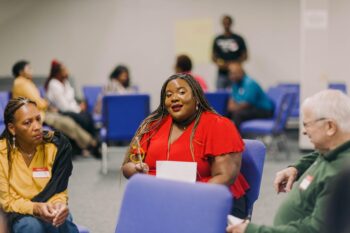
Mississippi Free Press’s “Solutions Circles” gather community members to discuss important topics, from youth and crime to elections. The first, pictured, took place at New Horizon Church in Jackson on Nov. 9, 2023. (Photo by Imani Khayyam/Mississippi Free Press)
Focus groups, solutions circles and other small-group conversations: These smaller, more intimate gatherings encourage in-depth community discussion around specific topics, often employing a structured format and trained facilitators. They can also serve as a form of community listening. In Jackson, Biloxi and other locations around Mississippi, the Mississippi Free Press has convened local community members to both discuss important election topics and brainstorm solutions. The sessions, which have been attended by roughly 20 to 50 people on average, have also helped the Free Press build community, identify sources and map out issues of concern, said founding editor and CEO Donna Ladd.
The importance of collaboration
When selecting an event format for your organization, consider factors such as your target audience and their preferences, the specific goals of your event, available staff and resources, and potential community partners. Partnering with other news outlets, civic groups and community organizations can be a powerful force-multiplier for election events, given their civic mission, said Shawn Mooring, who heads the Lenfest Institute’s Every Voice, Every Vote initiative.
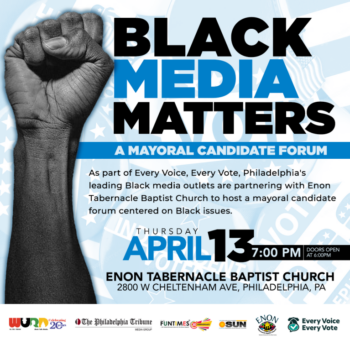
Black Media Matters was a 2023 Philadelphia primary election forum with mayoral candidates centered on black issues including education, safety, and economic opportunity. Community partner Enon Tabernacle Baptist Church collaborated with media partners WURD, The Philadelphia Tribune, and Philadelphia SUN.
Every Voice, Every Vote is one of several large-scale collaborations that have popped up in recent years to re-engage voters and improve election coverage. The initiative convened more than 100 Philadelphia newsrooms, community organizations and social media creators ahead of the city’s 2023 municipal election, and has since continued to support deeper, community-focused policy and electoral coverage. Town halls, panel discussions and community listening events — often orchestrated by multiple media organizations and community partners — are a key part of the project’s strategy.
“We really look at community organizations as trusted messengers,” Mooring said. “In many ways, they have deeper relationships in their communities than the media does, in terms of understanding what the community needs are, who the key contacts are and how to go about dispersing information.”
Public libraries and universities also make natural partners for election events. In Colorado, a major new collaboration between Rocky Mountain Public Media and Colorado State University, plus dozens of other newsrooms and organizations, has hosted listening sessions and documentary screenings around the state, said Sam Moody, the associate director of the Colorado Media Project.
Since 2022, the Milwaukee Journal Sentinel and the La Follette School of Public Affairs at the University of Wisconsin-Madison have also teamed up on an election project called the Wisconsin Main Street Agenda, which works to identify voter priorities and organize public forums around them. In September and October, the project will convene six events across Wisconsin, including four in which trained moderators from La Follette will facilitate tabletop conversations.
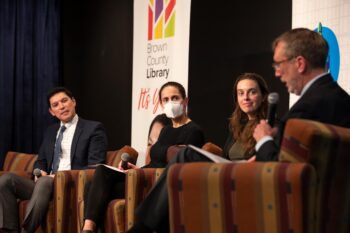
A 2022 town hall at the Brown County Public Library in Green Bay, Wis., grew out of an election events partnership between the Milwaukee Journal Sentinel and the La Follette School of Public Affairs at the University of Wisconsin-Madison. (Courtesy of the Milwaukee Journal Sentinel)
The project has proven popular: Roughly 100 guests are expected at each of the events, said Jim Fitzhenry, editor of the Journal Sentinel’s Ideas Lab. Collaborating with La Follette, which takes the lead on organizing the events, has also expanded the paper’s reach and impact.
“It’s a win-win for everybody,” Fitzhenry said. “Legacy news organizations and universities are similar in that they’re both experiencing tremendous change, and they’re both thought of as existing in these ivory towers. We both wanted to engage the public more — so it’s been mutually beneficial.”
Building feedback loops that outlast the election
News event organizers emphasize the importance of reciprocity in election engagement: After asking readers for their input and opinions, news organizations should incorporate that into their coverage. The Citizens Agenda, a model popularized by NYU’s Jay Rosen and Hearken, exemplifies this approach by refocusing election coverage on reader priorities, based in part on data gathered from listening sessions and other events. But it’s not the only means of building off reader feedback.
Read more: How community listening can help shape election-year coverage
In Wisconsin, Jim Fitzhenry also uses Wisconsin Main Street Agenda events as a recruiting ground for prospective op-ed writers. In Hawaii, Civil Beat records and publishes its “Meet the Candidate” sessions, and flags articles that have grown out of community conversations.
“Success for these events means meeting people where they are, but it also means making sure that we created a feedback loop,” Nishimoto said. “We tag stories that come from these interactions, so that we’re able to show the coverage that grows out of them — and a lot of the time, they’re really hyper-local stories with statewide resonance.”
For Maritza Félix, of Conecta Arizona, events serve an even more foundational journalistic role. The outlet’s cafecitos, both in-person and online, keep its journalists accountable to their audience, she said, and guarantees they’re fulfilling their public-service mission.
“This community engagement is how we make sure that the work that we’re doing is actually having an impact and is still needed by our audience,” Félix said. “That’s during an election, but also after it.”
Tips
- Don’t worry about attendance numbers. Election events often start small. And in community-focused journalism, quality engagement matters far more than audience draw. “Grassroots journalism — grassroots anything — starts with a small group of people and then goes out in concentric circles,” said Mississippi Free Press’s Donna Ladd. “The worst thing you could possibly do is give up due to low attendance, because that tells your community that you’re not in it for the long haul or the right reasons.”
- Focus on attendee needs. News organizations need to address access barriers proactively, Colorado Media Project’s Sam Moody said, particularly if they’re trying to reach a new or underserved audience. That might mean reaching out to local community organizations to scout out potential barriers before the event, then providing resources like childcare, food and transportation stipends. “It’s an acknowledgement that we’re asking for people’s time, which is novel for many newsrooms,” Moody said. It’s also a recognition that news organizations know they don’t serve everyone and are trying to address those gaps.
- Set expectations for civility upfront. Most election events include some guidelines for participation and appropriate behavior, and organizers should be ready to intervene if a conversation goes off the rails. That said, attendees may surprise you with their willingness to engage thoughtfully and respectfully, the Journal Sentinel’s Jim Fitzhenry said: “We found that people were really eager to get into public spaces and have these reasonable discussions, even though they had very different stances.”
- Lay some groundwork first. Before hosting an election event, talk to community organizations, survey residents or conduct on-the-ground reporting to establish a baseline understanding of the community’s election information needs. “We made sure that our reporters were on the ground talking to folks, finding out what was important to them,” Vermont Public’s Zielinski said. “One of the things we didn’t want to do is just parachute in … We wanted to make sure that we already had a little bit of a presence.”